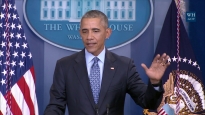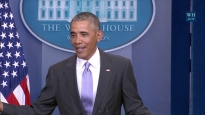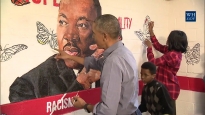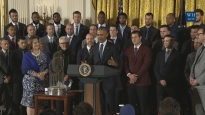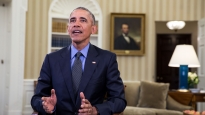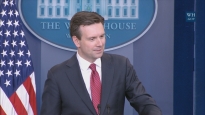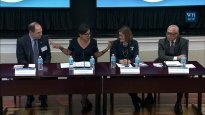Press Briefing 11/5/09
November 5, 2009
President Obama opens today’s press briefing saying real health insurance reform is closer than ever now that the AARP and American Medical Association have announced their support of a bill about to be voted on by the House of Representatives. Press Secretary Robert Gibbs conducts his regular briefing following. November 5, 2009. (Public Domain)
Download mp3 (30.9MB)
Briefing by White House Press Secretary Robert Gibbs, 11/5/09
THE WHITE HOUSE
Office of the Press Secretary
___________________________________________________________________________
For Immediate Release November 5, 2009
___________________________________________________________________________
For Immediate Release November 5, 2009
PRESS BRIEFING
BY PRESS SECRETARY ROBERT GIBBS
BY PRESS SECRETARY ROBERT GIBBS
James S. Brady Press Briefing Room
1:24 P.M. EST
MR. GIBBS: All right, now that the warmup band has finished playing. (Laughter.) Probably only get to say that once or twice in my life. I might as well try today, right?
Yes, sir.
Q What prompted the President to come out today and make that statement, which sounded pretty tough?
MR. GIBBS: Well, look, I think what prompted the President's coming down here to deliver that statement were two very important endorsements for health care reform -- one by the doctors, support by the doctors, and support by the organization that represents seniors in this country. I think, as you heard the President say, we're closer to getting health care reform than we've ever been, and I think today's endorsements bring us even closer.
Q Can I ask a second question?
MR. GIBBS: Sure.
Q On Afghanistan. The U.N. is pulling people out or relocating them. The British are increasingly concerned after that incident in which five soldiers were killed. The Iraqis can't get their act together on an election law, which apparently General Odierno has suggested might delay -- not impinge upon, but delay troop pullouts. How deeply is all of that affecting the President's decision-making now on Afghanistan? And is he having a hard time keeping ahead of developments here as he waits to announce what he's going to do?
MR. GIBBS: Well, let me -- let me try to address all of that. Steve, as you know, for the U.N. -- the U.N. has been involved in and been active in Afghanistan for over 50 years and they remain committed to doing so. I will point you to and will distribute for you all an interview that our U.N. Ambassador Susan Rice did today with NPR that states that. The British obviously have very recently increased their security force in the country.
And I think we're certainly hopeful that shortly we'll have the politics worked out of an election law that will continue the -- or not put any barrier in the way of drawing down our forces as the President is committed to doing in Iraq.
Look, there's no doubt that this continues to be a very dangerous part of the world, and developments always in a war zone happen quite quickly. But I think that the President is taking into account the political situation, the security situation, the health of our force, and all that needs to be done to ensure that we have a strategy that makes good on the goal of dismantling, disrupting, and ultimately destroying al Qaeda.
Q So you're hopeful that there will shortly be an election law?
MR. GIBBS: We are.
Q What makes you hopeful?
MR. GIBBS: We know the parties continue to work at this, and we're hopeful that an agreement will get done soon.
Yes, sir.
Q A couple questions on the Middle East. Saudi Arabia says it's carried out heavy air strikes on rebels in Northern Yemen. How concerned is the administration about this latest sign of instability in such an important oil-producing area?
MR. GIBBS: I don't want to get into commenting on -- I've seen only reports on the activities that you talked about, and I hesitate to get out and comment on them. I would point you to the Saudis on that.
Q Okay. President -- Palestinian President Abbas has said he will not run for reelection in January. What's the level of concern of the administration that it might lose a potential negotiating partner at a time when the peace process is already having a hard time getting off the ground?
MR. GIBBS: Look, we have tremendous respect for President Abbas. He has been an important and historic leader for the Palestinian people and a true partner for the United States. I think he has worked to better the lives of Palestinians. I would simply say that whatever he decides, we look forward to continuing to work with him and to continue to -- to continue in that collaboration to make the lives of Palestinians better.
Q And Israeli Prime Minister Netanyahu will be in Washington next week to speak to a conference. Will the President be meeting with him?
MR. GIBBS: I don't have a week ahead yet, but we'll have -- we may have more on that Friday as developments happen.
Yes, sir.
Q There's a conservative group running a TV ad -- the gist of it is -- the last line is if the government can't run a flu program, can we trust it to run America's entire health care system. Foregoing the entire health care system, are you worried --
MR. GIBBS: Foregoing the premise of the ad? (Laughter.)
Q Well, the idea that you are -- you are pushing a public option, so even if we -- if we don't accept --
MR. GIBBS: But, no, I appreciate that we're going to --
Q If you'd let me actually ask my --
MR. GIBBS: -- vitiate the premise of the question, but it's hard to accept the question without -- if you're going to do away with the entire premise of it.
Q Okay, well, I'll go on and ask the question I was going to ask, which is, are you guys concerned at all that the handling of the H1N1 vaccine is becoming a political liability that could hurt you in your health care effort?
MR. GIBBS: No, not at all. And let me -- I think the commercial -- obviously you've pointed out that the facts of the commercial are strained at best. I think -- I think anybody that looks legitimately at that claim would understand it's stupid and silly.
Q I understand --
MR. GIBBS: Leaving aside the premise of the commercial.
Q Well, forgetting for a moment the government takeover of health care rhetoric, the idea is there's --
MR. GIBBS: Do you think that's true?
Q Of course it's not true, but the idea that --
MR. GIBBS: You're enjoying this more than I am. (Laughter.) But I'm getting a great thrill out of it.
Q I am regretting the question as I say it. (Laughter.)
MR. GIBBS: Which is why I continue to ask to repeat it. (Laughter.)
Q But my point is you guys are pushing a government-run health care plan. And if there are people out there who are able to think, oh, that makes sense, the H1N1 vaccine program has not lived up to what the government, what the Obama administration, has suggested it should be, which you guys even acknowledge, then maybe they have a point. Maybe there is a point there.
MR. GIBBS: Well, you know, again, I think the premise of the commercial is entirely inaccurate. I think the point that they're trying to make isn't a strong one. Jake, there's no doubt that we have -- remember in March we were -- March or April, May, weren't we getting lambasted and snickered for the President telling people to wash their hands and sneeze into their elbows? So we have done everything, the President has done everything humanly possible to get ready for this epidemic.
We obviously had hoped that the assurances that we had gotten from manufacturers would bear out to be true. You're still growing vaccines in eggs. There are considerably more doses available for vaccine today than there were this time last week. We'll continue to -- staff will continue to meet here on a daily basis and keep the President updated to ensure that, whether it's seasonal vaccine for the flu, which comes, as I said, every year, or H1N1, that we adequately address the epidemic and the threat that it poses.
Q And our Capitol Hill correspondent Jon Karl wanted me to ask you if the administration had any reaction to the health care protests on Capitol Hill today.
MR. GIBBS: I'm sure there's a Jon Voight joke in here somewhere, given he was one of the featured speakers, but I --
Q You're not even going to try to make it? (Laughter.)
MR. GIBBS: No, my father always told me my mouth would get me in trouble, and I have a feeling if I acted on the line that I'd like to give you I'm almost positive that it would surely --
Q What do you have against Jon Voight?
Q Off the record.
MR. GIBBS: Bingo. (Laughter.)
Go ahead.
Q Robert, I want to follow up on --
MR. GIBBS: Off the record, I like that. (Laughter.)
Q Robert, I want to follow up on H1N1. A couple days ago I asked you whether or not the vaccine was going to go to terror suspects, detainees at Guantanamo Bay. You said there is no vaccine there now and none on the way, which led some people to believe that you were saying it was not ever going to go there. But the Pentagon says that it is going to go there. So can you say yes or no, whether or not terror suspects are going to get the vaccine?
MR. GIBBS: Let me explain -- what I said was accurate then and accurate now. The Department of Defense has a list for and a priority order for who will get vaccinated, and that priority list includes the men and women in uniform here and our men and women overseas. Just as there have been reports about -- today -- about H1N1 vaccine going to Wall Street firms that has led our director of the CDC to call state and local officials and remind them that there's a priority list for who should receive H1N1 vaccine, and will be sending a letter to states and localities again to remind them of what that is.
I'll point you to the Department of Defense on what the priority is -- the priority or the standing order for what happens. The priority is to ensure that the vaccine that they have is given to our troops here and in the field.
Q Okay, important for the troops to get it, but are you concerned that children in America are not getting the vaccine right now at a time when terror suspects may be getting, and as you said, Wall Street bankers are getting it.
MR. GIBBS: Well -- and I just said the CDC has called the city of New York and the state of New York. Remember, the CDC distributes vaccine to states and localities; states and localities make decisions about who gets that vaccine. The CDC director has talked to the state -- or has talked to the city about how they've distributed that vaccine, absolutely. Children that are in need of this vaccine will not get this after somebody else like a potential detainee at Gitmo.
Q On health care, is the President going to specifically endorse the House bill when he goes behind closed doors with House Democrats? Is he going to finally say, I'm for this?
MR. GIBBS: We'll tell you tomorrow after the meeting.
Q Without getting into personalities, can't you comment on the demonstration on the Hill?
MR. GIBBS: Well, I was just trying my Jon Voight line out.
Q It was an absence of a line. What's an actual line?
MR. GIBBS: No, I know. You know it would get me in trouble. You could write it for me and I would -- it's just not a good idea -- though many of --
Q Angelina Jolie?
MR. GIBBS: I won't get into that.
Q Talking about Jon Voight with an H?
MR. GIBBS: The -- look, I think -- yes, I mean, I think anybody that watches is struck by the fact that there's a rally going on without a solution on their side. They've rolled out a piece of legislation, and I use those -- I hesitate to even say that -- it's a series of old ideas that wouldn't cut the amount of money government spends on health care nearly to the degree that other bills would. It fails to provide the necessary insurance protections that families and businesses need to assure them that if they get sick their coverage isn't going to be dropped or their -- they and their family won't be discriminated against because of a preexisting condition. And it fails to cover virtually anybody in the country that already doesn't have health insurance.
I think many in the Republican Party have wanted to be active in this debate and the piece of legislation they've come up with I think is disappointing as a process in this debate and disappointing for millions of Americans that wanted help in finding affordable health care.
Q Isn't it legitimate for them just to demonstrate to say they don't like the approach the administration and the Democrats are pursuing?
MR. GIBBS: Absolutely. But this is a representative democracy. I assume they came to Washington to try to solve problems like small businesses that are dropping health care coverage because it's not affordable. So demonstrating is fine. It's well within your constitutionally protected rights in this representative democracy. I would also mention that if you are a representative in that democracy, it might also be good to have a solution that addresses some of those problems.
Q Is there an Afghanistan strategy meeting tomorrow or on Monday?
MR. GIBBS: Not that I'm currently aware of, but I will double-check that.
Q Thanks.
Q Robert, is this a case -- you guys just decided to use the bully pulpit to get the President out there today on health care, considering the demonstration was going on?
MR. GIBBS: No, again, Chuck, we have a -- you have a group of very important endorsements for health care reform. The largest group that represents doctors and medical professionals supports health care reform.
Q Sometimes you guys just put out press releases. Instead you brought the President out --
MR. GIBBS: I said he was a great opening act. (Laughter.)
Q On the -- you said -- so in response to this news -- going to swine flu, H1N1 -- in response to the news on Wall Street, with the Wall Street firms, is it -- are you guys resending guidelines that says hospitals --
MR. GIBBS: Yes.
Q -- so that, for instance, in this case, this is the New York Health Department that made this decision for the distribution.
MR. GIBBS: Yes.
Q You have contacted them with a letter? Consult with a phone call?
MR. GIBBS: The CDC director has contacted them and the CDC director is sending a letter to every state and city receiving vaccine to reiterate that vaccine should be going to priority groups, per the CDC.
Q You say it should. So basically Goldman Sachs should not have gotten any until the hospitals had gotten it -- is that what CDC is saying?
MR. GIBBS: That is a decision that local officials make.
Q Are you saying that they made the incorrect decision?
MR. GIBBS: The vaccine should be going to priority groups. If there are children that are -- that fit the priority groups that should be getting this and aren't, then yes, that went incorrectly to somebody else.
Q Was it prompted by Goldman Sachs
MR. GIBBS: Pardon me?
Q Was it prompted by Goldman Sachs getting the -- was this letter prompted by Goldman Sachs getting the vaccine?
MR. GIBBS: There was a report that showed that clearly -- I mean, you and I, Chuck, aren't in a priority group, right? Unless you have somebody -- a child that's under six months of age in your house, which you and I, unless you haven't told me something.
Q Jake --
MR. GIBBS: Right, Jake would be in a priority group because he does. But if there's somebody that is not in a priority group that is getting the vaccine, that is obviously a problem.
Q Is there anything beyond sort of harshly worded letter, "You shouldn't do this" -- is there anything the government can do or is it --
MR. GIBBS: Well, again, this week -- CDC distributes vaccine --
Q -- or should we just go into that New York public --
MR. GIBBS: CDC distributes vaccine to state and local authorities to administer. Look, the whole process has to work on many levels of government.
Q And following up on the Afghanistan question, is he -- it was strongly -- it seemed strongly implied that there was going to be another meeting with the Joint Chiefs before he left for Asia. Is that still going to happen before he leaves for Asia?
MR. GIBBS: That's my understanding, but I want to double-check on Friday. I just haven't seen a final schedule --
Q Okay, so it's still -- that hasn't changed -- whether it's Friday, Monday or Tuesday, he's still going to have another meeting before he leaves?
MR. GIBBS: That was the plan at least a few days ago, and I will get back to you as soon as I go talk to scheduling after this.
Yes, sir.
Q What kind of consultations or role did the White House play in the AARP or AMA endorsements?
MR. GIBBS: I'd have to check and see what outreach we made.
Q Would you do that? And ahead of tomorrow's meeting, the House bill does cost more than the $900 billion that the President set out in his address to Congress. The President has said that -- had said in one of his press conferences that he wasn't particularly enthusiastic about using surtaxes on millionaires to pay for health insurance. Can he back this bill even though it does not necessarily fit a lot of the parameters?
MR. GIBBS: Well, understand that what the President talked about was the net cost of health care coverage. And we're satisfied that -- pleased that that's what the bill does. I think what the President is going to go do tomorrow is talk to the House Democratic Caucus about the importance of continuing to make progress on health care reform. And we'll have a readout after the meeting.
Q I'm sorry, the net cost of health care coverage -- I mean, in the address he said he does not want a bill that adds a single dime to the deficit.
MR. GIBBS: And this wouldn't --
Q And that would not.
MR. GIBBS: And this would not. And it would actually cut the deficit over the next 10 years by $104 billion, all of which the President said and all of which this legislation accomplishes.
Q But he also did say that the cost that needed to be offset shouldn't exceed $900 billion, right?
MR. GIBBS: In net coverage, yes.
Q On Israel, Israel has apparently reportedly intercepted a ship of Iranian arms reportedly going to the Hezbollah. Does -- or Hamas rather -- does the White House have any confirmation, any comments? Is this a confirmation of Iran's --
MR. GIBBS: I will check with NSC. I don't have anything on that.
Q What's the meeting about between Geithner and the President this afternoon, do you know?
MR. GIBBS: I assume it's his weekly meeting -- weekly meeting with the President, as Secretary Gates and Secretary Clinton do.
Q And the President met with business leaders from his Economic Recovery Advisory Board on Monday, and he said their recommendations will be sent to Congress. Do you have any idea on the timing of that and whether --
MR. GIBBS: Well, again, remember this is not a formal board that presents something -- I think the step in between listening to ideas from an advisory board and something that the President might send to Congress obviously involves the President and his economic team evaluating the ides that they heard more about on Monday. And the President was pleased that several ideas that members of the board are passionate about made a case to the President. But this doesn't go directly from the advisory board to Congress.
Q I think the President -- he did say over the next two to three weeks that Geithner and Summers would be looking at the recommendations and then sending it on -- I mean, is that the plan, two to three weeks?
MR. GIBBS: Well, I think they're evaluating -- started evaluating those proposals later that day.
Q Robert, is it safe to assume that since you're going to double-check on the status of the Joint Chiefs meeting with the President that he will not make an announcement before he leaves for Asia? I just want to make sure --
MR. GIBBS: I have not been told that it won't happen but --
Q It's appearing increasingly unlikely that it will. That's a safe assumption, correct?
MR. GIBBS: It is a safe assumption, understanding that it could change.
Q Do you have any guidance to whether or not the country will know before Thanksgiving?
MR. GIBBS: Just the only guidance I have is the next several weeks, coming weeks.
Q Back on H1N1, was it wrong for Wall Street firms to even request, and would the administration more broadly say, look, if you're not in the priority category, don't ask? Or was it wrong for the bureaucracy at the city level to give it out, getting what it would consider a legitimate request? Who was wrong?
MR. GIBBS: Well, the CDC has priority groupings for those that are likely to be most susceptible to this strain of flu and to the effects obviously that it can cause: younger children, pregnant women, individuals that have -- or are in homes with children that I think are under six months of age all comprise part of that priority group. If there is anybody in that locality that fits that priority grouping that hasn't had made available to them vaccine and others that aren't in that priority grouping are getting it, then, yes, that is -- that is a failing of the system that should work.
Q And the word from the White House is if you're not on the list, don't ask. Is that correct?
MR. GIBBS: We want everyone ultimately to be -- to have access to and get vaccinated. We want, though, first to establish -- the CDC has -- that priority ordering, so that those most susceptible to the effects of this illness are vaccinated first.
Q Back to Gitmo, is it fair to say that the detainees are on a list of receiving it --
MR. GIBBS: I'd have to -- you'd have to ask the Pentagon of what their ultimate priority listing is. I don't know.
Q How concerned is the administration that Cash for Clunkers, in some respects, turned out to be a Cash for F-150 Ford trucks that did not really demonstrably increase gas fuel efficiency?
MR. GIBBS: Well, you couldn't get -- you could not get a -- you couldn't get the award unless the car you were turning in got a greater gas mileage than -- the car that you were getting got a greater gas mileage than the car that you were turning in. That was written into the law. I can get you final statistics for the amount, the average amount based on the cars that were purchased, what that ultimately saves in energy costs, in environmental costs, which ultimately mean our national security.
Q So it's okay?
MR. GIBBS: Again, there are certain benchmarks that are written in the law and you don't qualify for -- you don't qualify for the money unless you meet the benchmarks in the law.
Yes.
Q Robert, the President's trip to the Hill tomorrow -- what is his message, what is he trying to accomplish?
MR. GIBBS: Trying to get the bill out of the House. (Laughter.)
Q What will he be saying specifically? I mean, why is it important for him to go there tomorrow?
MR. GIBBS: Look, I think it's important for members to hear the importance of continuing to move this process along, continuing to make progress on reforms that are real and tangible for the American people -- cutting their costs, covering more people, and just as important as anything else, ensuring -- no pun intended -- that we have genuine insurance reforms that stop the type of things that we've seen in the past where coverage is dropped if you're sick or you have a preexisting condition -- something that's not in Republican legislation.
Q Is his visit a sign that he's concerned the votes aren't there?
MR. GIBBS: No, his visit is a sign of trying to continue to make progress and get this done.
Q One other thing. Senator Graham is pushing for a vote on an amendment either today or in the coming days that would prohibit Khalid Sheikh Mohammed and other 9/11 conspirators from being tried in federal court. He wants them tried in military commissions. He believes trying them in civilian courts lowers the status of the 9/11 attack to a common crime, not a war crime. What is the administration's position on that?
MR. GIBBS: Let me get guidance from Leg Affairs and NSC on that.
Q Okay.
Q So the President goes to the Hill tomorrow and he has these conversations with House members -- can he understand or can the White House understand the reasons why some Democrats, if they represent more conservative districts in the country, may vote against this bill?
MR. GIBBS: Well, I think they'll get a chance to talk about those concerns and ask the President questions, sure.
Q So he can understand if some Democrats vote against this bill? And will the White House give some of these Democrats essentially a pass to vote against it?
MR. GIBBS: I don't -- that's a lot of legislative maneuvering that is in a different department. I think the President is going to make the case for why getting health care reform done this year is important for the American people to make good on our promise that he certainly made and a promise that we have struggled to keep for 40 years.
Q Does that include or not include an explicit endorsement of the House bill?
MR. GIBBS: Well, I don't know what he's going to say tomorrow because he hasn't said it.
Q So you don't know --
MR. GIBBS: I haven't seen the remarks.
Q He just hasn't formulated a position yet?
MR. GIBBS: I haven't seen the remarks.
Anybody? Jon? Go ahead, Scott.
Q What about on the Senate side? You said getting it done this year. Is the President disheartened by the potential of a delay on the Senate side?
MR. GIBBS: I think our goals remain the same and believe that -- I think the House and the Senate believe we can get this done this year.
Q He's meeting with the Hispanic Caucus today and there's talk on the Hill about whether or not the House bill will be -- will have an amendment to exclude undocumented workers from the health insurance exchange. What's the White House position on that? Is that going to be discussed today?
MR. GIBBS: I assume that will come up today and I can try to get a readout from that meeting. I know there's stuff that's ongoing on Capitol Hill that I don't want to inject myself into.
Q Is that what you've said in the past? You said he will not sign a bill that -- right?
MR. GIBBS: We have, yes.
Q So that's his position -- he will not sign a bill unless it includes that provision?
MR. GIBBS: That's what we've said in the past. I know they're working on stuff on Capitol Hill that --obviously I'm not up there and I will let them work on that.
Q One other. Valerie Jarrett the other day was asked about the ongoing back-and-forth with Fox News. She used the phrase that she and others in the administration are speaking "truth to power." Is that the administration's view of how you guys are behaving?
MR. GIBBS: I don't know that I saw the interview that you're referring to.
Q She characterized your stance as --
MR. GIBBS: I'm happy to look at the transcript after this.
Steve.
Q Robert, you said you want -- you still want to get health care passed this year. Is there a deadline? And if it slips --
MR. GIBBS: December 31st. (Laughter.)
Q If it slips into next year, does this become undoable because it's an election year?
MR. GIBBS: I'm not going to get into hypotheticals of what happens next year. The President believes and I think -- believes we can get this done this year.
Q Why isn't he setting it? He set a deadline earlier this year that he wanted things passed --
MR. GIBBS: I don't know if you can be more explicit than "this year." I mean, that's --
Q So that's the deadline -- December 31, 2009.
MR. GIBBS: The guy said we're going to get it done this year. I don't -- I hope it's not news that the end of the year is approximately late in the evening on the 31st of December. But I can confirm that.
Q Eastern time? (Laughter.)
MR. GIBBS: Good question. I don't --
Q I have two quick questions, but first, can you confirm or deny that that was going to be a "Deliverance" reference?
MR. GIBBS: It was not. It was not.
Q My first question. You met with Fox News's Michael Clemente --
MR. GIBBS: Can I ask you a question? Are these questions in order of their importance? (Laughter.) I just had one, so go ahead. (Laughter.)
Q You met with Fox News's Michael Clemente recently, and since then it seems like the White House has backed off of its rhetoric on Fox News. I'm wondering if you could give us a read on that meeting, and did Clemente make any concessions at that meeting?
MR. GIBBS: You know, I've been asked this and I've answered it. I'm happy to meet with people that also want to meet with me, and I'm happy to have those meetings be private.
Q And secondly --
MR. GIBBS: No, no, we're -- you're up to a third, so we'll go to Carol.
Q Thanks. Governor Charlie Crist said today that he did not endorse the stimulus bill, and I'm just wondering if the White House considered his appearance with the President in February and what he said then, that it was important to pass that, as an endorsement?
MR. GIBBS: I think his words at that event speak for themselves. I think he was very supportive of the legislation and supportive of the benefits that it would have and has had for the state of Florida in seeing positive economic growth.
Q So you would say yes.
MR. GIBBS: I would say yes, yes.
Q And can I also ask just one other thing about oysters? Senator Landrieu and -- oysters -- Senator Landrieu and Nelson are introducing a bill to block the FDA to prohibit eating raw oysters. They're saying it's going to be bad for the economy down there. I mean, does the White House agree with what the FDA is doing there?
MR. GIBBS: I haven't the slightest idea, to be -- (laughter.)
Q You're from Alabama.
MR. GIBBS: I am, and I like raw oysters. But other than that, I don't -- I'd have to -- I'd have to figure out who to ask about that legislation. Thanks, guys.
Q Do they tell you to clam up? (Laughter.)
MR. GIBBS: That's good.
END
1:54 P.M. EST
|
January 18, 2017
|
January 17, 2017
|
January 16, 2017
|
January 16, 2017
|
|
January 14, 2017
|
January 13, 2017
|
January 13, 2017
|
January 12, 2017
|
